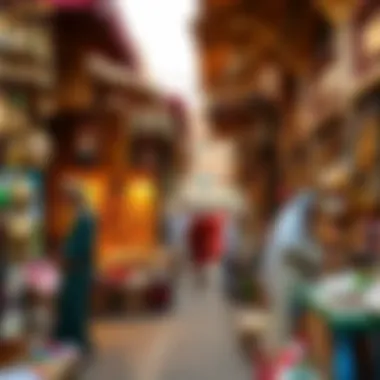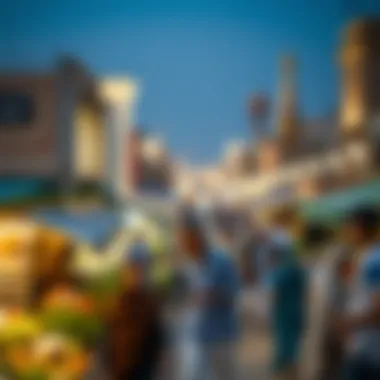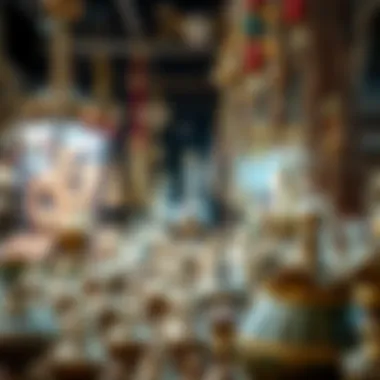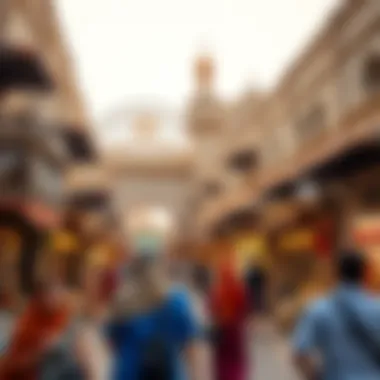Discover Souq Al Jubail: Culture Meets Commerce in Dubai


Intro
Souq Al Jubail stands as a vibrant emblem at the crossroads of tradition and modernity in Dubai. This marketplace is not just about buying and selling; it’s a living tapestry woven with the threads of age-old customs and contemporary commercial practices. From fresh produce to artisanal crafts, the souq reflects Dubai's diverse offerings, catering to locals and tourists alike.
In this deep dive, we will explore not only the unique features of Souq Al Jubail but also its historical significance, the role it plays in the local economy, and the impact it has on Dubai's fast-paced real estate market. By the end, investors, expatriates, realtors, homeowners, and entrepreneurs will gain valuable insights into how this bustling marketplace fits into the larger picture of Dubai's vibrant scene.
As we journey through this hub of culture and commerce, we'll discover how it serves as a barometer for market trends, investment prospects, and community life in one of the world’s most dynamic cities.
Understanding Souq Al Jubail
The understanding of Souq Al Jubail transcends mere recognition of its physical space. In the heart of Dubai, this marketplace embodies a rich tapestry of tradition entwined with modern commerce. Investors, expatriates, realtors, homeowners, and entrepreneurs are particularly drawn to this hub not only for its vibrant offerings but also for its indicative role in the local economy.
Grappling with the essence of Souq Al Jubail offers valuable insights for stakeholders looking to thrive in Dubai's evolving landscape. Recognizing its historical backdrop, cultural layers, and architectural charm sets a solid groundwork for appreciating its significance. This understanding is essential, especially considering Dubai’s global market footprint.
Historical Background
Tracing the history of Souq Al Jubail is like opening a book filled with ancient stories. Established during Dubai's initial phases of urbanization, the souq has undergone several transformations, mirroring the city's own evolution. Historically, it served as a meeting point for tradesmen and local merchants, facilitating the exchange of both goods and ideas.
The marketplace isn’t just a commercial space; it is a living archive of the region's past. It retains echoes of traditional spice trading and fish markets, beckoning those who appreciate its layered history. From the early days where bartering was the norm to the present, where modern business practices reign, the souq narrates a profound journey.
Cultural Significance
The heart of Souq Al Jubail pulses with cultural vibrancy, acting as a microcosm of Dubai’s rich heritage. Visitors and locals alike find more than just products; they witness the spirit of community and tradition. Craftsmanship, especially in local cuisine and artisanal goods, showcases the skills passed down through generations.
Its role becomes particularly evident during festive seasons when the souq transforms into a stage for cultural exhibitions, art displays, and food festivals. These events not only attract visitors but also foster a sense of identity among Emiratis, making Souq Al Jubail a beacon of cultural pride.
Architectural Features
When one meanders through Souq Al Jubail, it becomes evident that the architectural aspects are as noteworthy as the offerings. Traditional Arabian design elements blend harmoniously with modern aesthetics. The open-air layout promotes a welcoming atmosphere, while intricately designed arches and vibrant mosaic tiles honor local heritage.
Shaded walkways engage visitors in a sensory experience, accentuating the sights and sounds of commerce. The careful integration of green spaces also introduces a refreshing element, contrasting with the bustling commercial activity. This thoughtful design emphasizes not just the functionality of the space but also its intention to connect people with the historical roots of Dubai.
As one navigates through the intricate lanes of Souq Al Jubail, the interplay between commerce and culture becomes increasingly clear. Sustainability, community, and history converge here, making it a compelling area for exploration. For stakeholders, understanding these aspects not only enhances the appreciation of this space but also heightens awareness of the opportunities that lie within its reach.
Economic Role of Souq Al Jubail
The interplay between commerce and culture at Souq Al Jubail underscores its significance in Dubai's bustling economy. Positioned at the junction of traditional markets and modern retail, this souq is not just a place for trading goods but also a vibrant ecosystem that fosters local businesses and attracts investments. Understanding its economic role requires a close look at three critical facets: its contribution to the local economy, the employment opportunities it generates, and the dynamic nature of its market.
Contribution to Local Economy
Souq Al Jubail stands as a cornerstone for the local economy, channeling a steady flow of commerce that benefits numerous stakeholders. The marketplace provides a platform for fresh produce and artisanal goods, attracting both locals and visitors. This engagement stimulates various sectors from agriculture to services, creating a ripple effect on income and revenue.
Additionally, the souq helps preserve traditional trading practices while embracing modernity. For instance, the presence of local farmers selling their fresh produce not only guarantees a source of income for them but also reinforces a sustainable cycle that supports the community. The infusion of tourist dollars, brought in by the attractive cultural aspects of the souq, furthers economic growth; as folks flock to experience authentic Arab culture amidst a contemporary setting.
“Souq Al Jubail serves as a cultural heartbeat, pulsing life into the local economy through commerce and community.”


Employment Opportunities
An important aspect of Souq Al Jubail's economic impact is the array of employment opportunities it creates. From vendors serving customers to artisans crafting unique goods, the souq employs a diverse workforce skilled in various trades. These jobs often offer fair wages and can serve as a stepping stone for individuals seeking to build a career.
Moreover, the souq is not just limited to traditional roles. With the rise in tourism, new positions in marketing, management, and hospitality have emerged, reflecting a shift towards a more integrated approach to commerce. As the souq continues to evolve, it opens doors for expatriates as well as local talent, enhancing the job market in Dubai.
Market Dynamics
The market dynamics of Souq Al Jubail showcase a fascinating blend of competition and collaboration. Unlike more sterile shopping malls, the souq thrives on personal interaction. Negotiation is a common sight, as buyers and sellers engage in conversation, helping to foster relationships and build trust. It creates an environment where prices can fluctuate based on demand, offering consumers an authentic shopping experience.
Additionally, Souq Al Jubail faces competition from modern retail environments that feature convenience and consistent pricing. Yet, this very competition incentivizes the souq to innovate and enhance its offerings continually. The introduction of online sales and partnerships with local restaurateurs signifies how the souq is adapting to modern-day consumer needs while remaining true to its roots.
In summary, the economic role of Souq Al Jubail is multi-faceted and critical to the local landscape. By contributing to the economy, creating jobs, and adapting to changing market conditions, it stands adept in its mission of blending culture with commerce. Investors, expatriates, realtors, and entrepreneurs alike should take note of its evolvement, as it poses opportunities rich in potential.
Product Offerings in Souq Al Jubail
The heart of Souq Al Jubail lies in its diverse product offerings, which are not merely items for sale but a reflection of the rich cultural tapestry of Dubai. Each stall and shop speaks to the fusion of tradition with modern entrepreneurial spirit, catering to both the discerning expat and the curious tourist. Understanding the product landscape here is crucial for investors and those looking to tap into the commercial potential of this vibrant marketplace.
Fresh Produce and Seafood
One of the standout features of Souq Al Jubail is its impressive array of fresh produce and seafood. Shoppers can find fruits and vegetables sourced from local farms, ensuring quality and freshness, often arriving just hours before they hit the shelves. Whether it’s the vivid hues of ripe oranges or the crisp greens of fresh lettuce, the market brims with flavors intrinsic to the region.
Moreover, the seafood section is nothing short of spectacular. With the Arabian Gulf at its doorstep, the souq offers a bounty of choices, from tender shrimp to succulent king fish. Customers are often seen bustling around, engaging in lively negotiations with fishmongers, each with a story about their catch from the previous night. This not only adds to the experience but also cultivates a sense of community amongst vendors and buyers alike.
Handicrafts and Artisanal Goods
Venturing deeper into the souq, one is greeted by the allure of handicrafts and artisanal goods. This section is a treasure trove of handmade products that encapsulates the skill and artistry of local craftsmen. From intricately woven carpets that tell tales of cultural heritage to hand-painted pottery that showcases exquisite designs, the variety is immense.
Each piece carries a narrative. Vendors often share the backstory of their craft, encouraging shoppers to appreciate the labor and dedication embedded in every item. Tourists looking to take a piece of Dubai back home can find unique souvenirs here, while local shoppers can drape their homes in cultural elegance. It’s a delightful mix where the old-world charm marries contemporary aesthetics, creating a market atmosphere that resonates with authenticity.
Local Fashion and Textiles
Finally, no exploration of Souq Al Jubail would be complete without diving into the local fashion and textiles segment. Given the rich textile traditions of the Middle East, this area offers a variety of clothing options that reflect both traditional and modern styles. Visitors can browse through vibrant fabrics—silks, linens, and blends that are perfect for the heat of the desert.
Many shops showcase not only ready-made garments but also offer tailoring services. Shoppers can have outfits custom-fitted, allowing for a personal touch. From elegant abayas to chic casual wear, the styles cater to a wide audience. Moreover, local designers often showcase their collections here, contributing to a budding fashion scene that’s increasingly gaining recognition.
The eclectic product offerings at Souq Al Jubail exemplify much more than retail; they are a cultural exploration, allowing individuals to engage deeply with the heart of Dubai.
In summary, the product offerings at Souq Al Jubail present an exciting opportunity for both investment and engagement. By tapping into the fresh produce, artisanal crafts, and local fashion, one can not only contribute to the local economy but also become a part of Dubai’s vibrant marketplace narrative.
Visitor Experience at Souq Al Jubail
Exploring Souq Al Jubail offers visitors a glimpse of a dynamic marketplace where tradition harmoniously collides with modernity. This unique destination captures the essence of Dubai’s cultural diversity and economic vitality. To appreciate everything the souq has to offer, being aware of the visitor experience is crucial. This experience goes beyond simple shopping; it encompasses everything from navigating the marketplace to enjoying delicious local dishes and participating in celebrations that showcase the region's festivals and culture.
Navigating the Souq
Walking into Souq Al Jubail is akin to stepping into a living tapestry of sights, sounds, and smells that evoke both the old and the new. The layout of the souq is designed to facilitate exploration, with narrow alleys and vibrant stalls beckoning visitors. A good map or a sense of direction will serve one well, although even without one, getting lost might just lead to unexpected treasures. Stalls and shops brim with local products, from fresh seafood to handmade jewelry, and each corner seems to hold a story.


Ample signage in both Arabic and English helps, and locals are often eager to assist if someone looks puzzled. An important tip is the timing of one's visit; opting for early morning can lead to less crowded spaces, making it easier to browse. The vibrant atmosphere at a busier afternoon, however, is pulsating with life, providing a different kind of thrill.
Dining and Refreshment Options
Food vendors within Souq Al Jubail offer a culinary journey that is just as important as the shopping experience. Carts and small eateries serve traditional Emirati dishes like shawarma and falafel, enticing even the most discerning palate. A visit wouldn’t be complete without sampling fresh dates or trying out karak tea, a spiced, milky tea that has become somewhat of a cultural symbol.
Dining in the souq also encourages conversations and connections. Tables filled with families and groups invite one to bond over a meal or a quick snack, making it easy to engage with the local community. Additionally, for those seeking more upscale options, there are a few restaurants that blend contemporary dining with traditional cuisine, providing a feast for both the stomach and the eyes.
Events and Festivals
The calendar at Souq Al Jubail is rich with events and festivals that capture the region's vibrant spirit. These events often showcase traditional music, dance, and art, enabling visitors to immerse themselves in the local culture. Festivals can include everything from celebrations during Eid to special events for national holidays, where markets transform into venues of joy and festivity.
Attending such events allows visitors to witness local customs and community spirit firsthand. Moreover, they provide an opportunity to purchase unique handcrafted items that celebrate the artistry of local artisans. Such experiences not only enhance one’s visit but also offer insights into the cultural fabric of Dubai.
"Souq Al Jubail’s visitor experience is where shopping meets cultural immersion, ensuring each visit is uniquely memorable."
In summary, the visitor experience at Souq Al Jubail is multidimensional. With thoughtful navigation, delightful culinary offerings, and engaging events, this hub stands out as more than just a marketplace; it encapsulates the heart of Dubai's rich tapestry of culture and commerce.
Impact on Dubai's Real Estate Market
The proximity of Souq Al Jubail to residential areas has far-reaching effects on the real estate landscape in Dubai. Given the souq's central location, it attracts not just locals but also expatriates looking to immerse themselves in the local culture. This influx increases demands for nearby housing. People tend to gravitate towards areas that boast not only convenience but also a vibrant market offering cultural experiences. Thus, properties near Souq Al Jubail can enjoy higher occupancy rates and enhanced value.
Proximity to Residential Areas
Living nearby Souq Al Jubail is a double-edged sword. On one hand, residents appreciate easy access to a market filled with fresh produce, artisanal goods, and diverse dining options. On the other hand, this rising popularity can lead to issues such as noise and congestion. Investors should take these factors into account when considering properties close to the souq. With a steady influx of people visiting for shopping and cultural experiences, residential areas have become increasingly desirable.
- Benefits:
- Considerations:
- Increased demand for housing.
- Higher market values of local properties.
- Potential for noise and congestion.
- Possible impact on property maintenance and management.
Development of Surrounding Infrastructure
The development around Souq Al Jubail is not just about what happens within its walls. The surrounding infrastructure plays an essential role in shaping the market's performance. Roads, public transport, and other amenities are vital for attracting both visitors and potential residents. Recent enhancements in road connectivity and introduction of transportation services make it easier for people to access the souq. These developments have a direct correlation with the rates of property prices and rental yields.
- Positive Impacts of Infrastructure Growth:
- Improved accessibility enhances desirability of nearby properties.
- As living spaces become more attractive, they lead to increased investments.
Investment Opportunities Near Souq Al Jubail
As properties within Dubai evolve to accommodate a growing population, various investment opportunities are emerging around Souq Al Jubail. Investors can tap into residential developments, commercial spaces, and mixed-use facilities. The growing artisanal and craft market also presents avenues for investment in retail spaces, catering to both tourists and locals alike. However, prudent investors must do their homework, keeping an eye on market trends and potential shifts in consumer preferences.
- Types of Investment Opportunities:
- Residential apartments targeting families and expatriates.
- Commercial spaces for retail or service businesses.
- Mixed-use developments that combine both residential and commercial elements.


Homes and commercial spaces in proximity to the souq encapsulate not just trends, but a lifestyle choice. The essence of living close to a cultural hotspot cannot be understated. As Dubai evolves, so does the real estate potential surrounding Souq Al Jubail.
Successful navigation of the local market dynamics can lead to lucrative returns for those willing to take a chance on this culturally rich locale.
Challenges Faced by Souq Al Jubail
The resilience of Souq Al Jubail in Dubai's bustling marketplace isn't just reliant on its rich history or diverse offerings; it also faces several hurdles that could affect its future. Addressing these challenges not only informs stakeholders and potential investors but it spotlights the strategic decisions necessary to navigate the changing commercial landscape. Understanding these issues can help investors, entrepreneurs, and local business owners better prepare for future opportunities and threats.
Competition with Modern Shopping Malls
With the rise of modern shopping malls, Souq Al Jubail finds itself squeezed between maintaining its unique identity and adapting to an evolving marketplace. Malls such as Dubai Mall and Mall of the Emirates offer gleaming attractions: luxury brands, state-of-the-art entertainment facilities, and a climate-controlled environment. As a result, the traditional appeal of Souq Al Jubail, which thrives on genuine interactions and local flavors, is increasingly overshadowed.
In light of this competition, the souq must effectively showcase its advantages — an authentic snapshot of Emirati culture and vibrant community atmosphere. The charm lies not just in shopping, but in the experience of wandering through narrow lanes filled with scents, colors, and local goods, which modern malls often cannot replicate. Investors will need to consider how to enhance these aspects while making the souq a competitive option for today’s discerning consumers.
Maintaining Authenticity in a Changing Market
As consumer preferences evolve, the balance between modernization and maintaining authenticity stands at the forefront of Souq Al Jubail's challenges. The influx of upscale brands can dilute the traditional essence that drew so many to the souq.
Authenticity encapsulates more than just products—it's about heritage, storytelling, and community bonds. For example, encouraging local artisans to showcase their crafts next to contemporary vendors can bridge this gap. This preservation of culture must be a priority, as both expatriates and tourists seek experiences that resonate deeply with social and historical contexts. Such a dual strategy could enhance customer loyalty and uphold the souq's character amid shifting expectations.
"The blending of modernity with tradition is not merely a trend; it’s vital for the sustainability of cultural icons like Souq Al Jubail."
Environmental Concerns and Sustainability
In a world increasingly focused on sustainability, Souq Al Jubail isn't exempt from scrutiny regarding environmental practices. From waste management issues to energy consumption, the souq must evolve if it wishes to remain relevant in an ecologically-conscious market. Developing green practices could offer invaluable advantages, enhancing its appeal not just to environmentally-minded consumers, but to investors committed to sustainable development.
Efforts could include adopting responsible sourcing for products, reducing plastic use, or implementing efficient waste management systems. By prioritizing sustainability, Souq Al Jubail can fortify its position as a noteworthy cultural and commercial entity and attract businesses that reflect these values.
In summary, while Souq Al Jubail faces considerable challenges, including competition from modern malls, the struggle to maintain its authentic roots, and pressing environmental concerns, proactive strategies can address these hurdles. Emphasizing tradition while adapting to new market realities, and committing to sustainability will be vital for its future success.
The Future of Souq Al Jubail
As we delve into the future of Souq Al Jubail, it becomes clear that its evolution is bound to be a significant aspect of Dubai's broader commercial landscape. This iconic marketplace, steeped in both history and culture, holds immense potential for growth and transformation. The interplay of traditional and modern influences positions Souq Al Jubail at a unique crossroads, paving the way for opportunities that cater to both residents and tourists. Moreover, embracing forward-thinking strategies will be key to enhancing its role in a rapidly changing urban environment.
Potential Developments and Expansions
The prospect of developments and expansions at Souq Al Jubail is intriguing. Plans are underway to broaden the range of shops and services, which can attract a more diverse audience. For instance, adding upscale dining options, art galleries, and interactive cultural exhibitions could not only enhance visitors' experience but also elevate the market's status as a major destination in Dubai. Furthermore, introducing themed events or seasonal festivals could create buzz and increase foot traffic, drawing in crowds eager to engage with the local culture and culinary delights. These changes aim to strike a balance between preserving the historical essence of the souq while also integrating modern retail strategies.
- Opportunity for mixed-use developments, blending retail with housing.
- Potential partnerships with local artisans for crafts and cultural events.
- Increased green spaces to promote community interactions and leisure.
Enhancements in Visitor Experience
To keep up with the needs of discerning modern consumers, enhancing the visitor experience in Souq Al Jubail is paramount. Implementing technologies like mobile apps for interactive maps or augmented reality features could provide real-time information about products and events. Additionally, improving the layout of the souq to facilitate easier navigation will make the market more welcoming. Comfortable seating areas and shaded spots can encourage shoppers to linger longer, discovering hidden gems in the myriad of stalls and stands. The aim is to create an immersive atmosphere that blends shopping with an authentic taste of local culture.
- Engaging storytelling initiatives about the market's rich history.
- Improved sanitation and security measures to build trust with visitors.
- Creating a friendly environment for families through activities for children.
Role in Dubai's Vision for Future Development
Souq Al Jubail’s role in Dubai's grand vision for future development cannot be understated. As authorities align their strategies with global trends, the souq can become a linchpin in promoting sustainable tourism and preserving cultural heritage. By focusing on environmentally friendly practices, such as reducing plastic use or promoting local produce, the souq can set a standard for other markets in Dubai. Additionally, as part of broader urban planning initiatives, it can help contribute to goals such as enhancing public transport links or upgrading infrastructural facilities around the area.
"The future of marketplaces like Souq Al Jubail is not just about commerce. It's about fostering community, celebrating tradition, and engaging with the future."
In summary, the future of Souq Al Jubail holds considerable promise. Embracing a vision that intertwines growth with authenticity can lead to greater economic development while reinforcing the souq’s identity as not just a market, but a cultural experience shaping the heart of Dubai.



